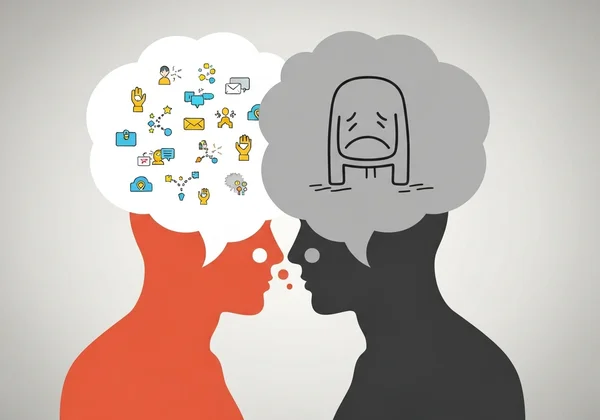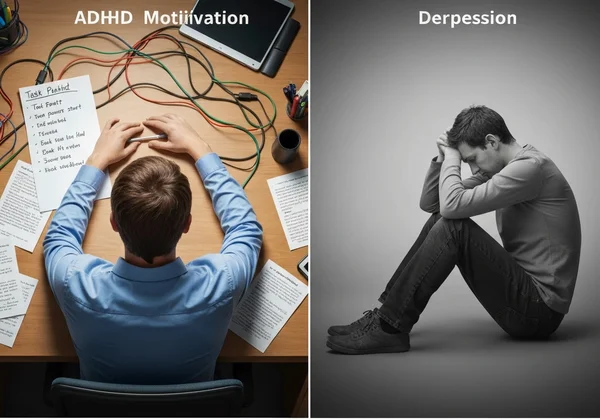Adult ADHD Self-Report Scale (ASRS Test): Unraveling Symptoms vs. Depression
November 11, 2025 | By Miles Harrison
Feeling stuck in a fog of low motivation, persistent distraction, and emotional turmoil? You're not alone. Many adults find themselves grappling with these symptoms, wondering if they're facing burnout, depression, or something else entirely. The confusion is understandable, especially since the signs of adult ADHD and depression can look remarkably similar. But how to test yourself for ADHD? This article will explore the subtle yet crucial differences between these two conditions and explain how the confidential ASRS test can be a powerful first step toward gaining clarity. If you're ready to understand your own mind better, a great starting point is a trusted self-screening tool.

Understanding Overlapping ADHD & Depression Symptoms
At first glance, the symptom overlap between adult ADHD and depression is significant. Both can disrupt your daily life, impacting your career, relationships, and self-esteem. They can leave you feeling overwhelmed, unproductive, and misunderstood. However, the underlying reasons for these shared struggles are often very different.
Motivation & Focus: Is it ADHD or Depression?
A common complaint for both conditions is a profound lack of motivation and an inability to concentrate. In depression, this often stems from anhedonia—the loss of interest or pleasure in activities you once enjoyed. The world can seem gray and uninspiring, making it feel pointless to start any task. The focus issues are often tied to mental slowness and persistent negative thoughts that cloud your thinking.
In ADHD, the challenge with motivation and focus is more about executive dysfunction. Your brain may know exactly what needs to be done, but initiating the task feels impossible—a phenomenon known as task paralysis. Distraction isn't just a lack of focus; it's an inability to regulate it. You might be easily pulled away by external stimuli or internal thoughts, yet you can also experience "hyperfocus" on a topic that genuinely interests you. The motivation issue isn't a lack of desire, but a struggle with the brain's reward and activation system.

Beyond Low Mood: Other Shared Challenges
The crossover doesn't stop at focus. Both conditions can lead to irritability, sleep disturbances, and feelings of worthlessness. Someone with depression may feel worthless due to a pervasive sense of hopelessness and self-criticism. In contrast, an adult with ADHD might feel this way after a lifetime of struggling to meet expectations, being called "lazy" or "careless," leading to a deeply ingrained sense of failure. Distinguishing these nuances is key to finding the right path forward, which is why a targeted ADHD self-assessment can be so insightful.
How the ASRS Test Offers Initial Clarity
When symptoms are so intertwined, how can you begin to untangle them? This is where a specialized screening tool becomes invaluable. The Adult ADHD Self-Report Scale (ASRS) is designed specifically to pinpoint the signs of ADHD as they manifest in adulthood, providing a focused lens through which to view your experiences.

Targeting ADHD-Specific Symptoms with the ASRS V1.1
The ASRS V1.1 is not just any online quiz. It's a credible screening instrument developed in partnership with the World Health Organization (WHO) and validated by researchers at Harvard University. The 18 questions are carefully crafted to align with the diagnostic criteria for ADHD, focusing on core symptoms like inattention, hyperactivity, and impulsivity. By asking about specific situations—like difficulty finishing the final details of a project or feeling overly active and compelled to do things—it helps identify patterns that are characteristic of ADHD, rather than the general malaise of depression.
What Your ASRS Results Can Tell You (and What They Can't)
It is crucial to understand that the ASRS test is a screening tool, not a diagnostic one. A high score doesn't mean you definitively have ADHD, but it strongly indicates that your symptoms are consistent with the condition and that a conversation with a healthcare professional is a logical next step. Conversely, a low score makes ADHD less likely, but doesn't completely rule it out, especially if other factors are at play.
After completing the test, you receive an instant, AI-powered personalized report. This report goes beyond a simple score, offering deeper insights into your response patterns. It can serve as an organized, valuable document to bring to a doctor's appointment, helping you articulate your concerns clearly and efficiently. You can discover your results privately and immediately.
Distinguishing ADHD vs. Depression: Key Differences
While the symptoms may appear similar on the surface, their origins and expressions often differ. Understanding these distinctions is a critical part of the self-discovery process.
The Nature of Inattention: Distinct Manifestations
Inattention in depression is often described as "brain fog." It's a heavy, slow feeling where thinking requires immense effort. It's pervasive and not typically relieved by changing tasks.
Inattention in ADHD is more dynamic. It’s a struggle to direct and sustain attention on non-preferred tasks. The mind may feel like it has "too many tabs open" at once. However, when something is new, interesting, or urgent, a person with ADHD can often lock in with intense focus (hyperfocus). The inattention is situational, not constant.

Emotional Dysregulation: Differing Origins
Emotional intensity is a hallmark of both conditions, but it manifests differently. Depression is characterized by a persistent and enduring low mood, sadness, or emptiness that can last for weeks or months.
Emotional dysregulation in ADHD often involves rapid, intense mood swings. An individual might feel intense frustration, anger, or excitement that seems disproportionate to the trigger, but this emotion can pass just as quickly. This is often linked to Rejection Sensitivity Dysphoria (RSD), an extreme emotional sensitivity to perceived criticism or rejection. The key difference is the duration and trigger: depressive moods are long-lasting and often un-triggered, while ADHD emotional shifts are often short-lived and reactive.
When to Seek Professional Help & Your Next Steps
Navigating these symptoms can be isolating, but you don't have to do it alone. If your daily functioning is significantly impaired, seeking professional help is a sign of strength. A qualified professional, such as a psychiatrist or psychologist, can conduct a comprehensive evaluation to consider all possibilities, including the presence of both ADHD and depression (comorbidity), which is quite common.
Using a tool like the free ASRS test on our site can be an empowering first step. It provides you with structured information about your own experiences, helping you feel more prepared and confident when you do decide to speak with a professional. Remember, this is a screening tool, not a diagnosis. Its purpose is to empower you with information. Use your personalized AI report from our online ADHD screening as a guide to facilitate a more productive conversation with a healthcare provider. Take the first step today to gain initial clarity and move forward on your path to better mental health.
Frequently Asked Questions About ADHD, Depression, and the ASRS Test
What does the ASRS test for specifically?
The ASRS test is designed to screen for the symptoms of Attention-Deficit/Hyperactivity Disorder (ADHD) in adults aged 18 and older. It assesses the frequency of recent experiences related to inattention, hyperactivity, and impulsivity, based on the diagnostic criteria used by clinicians.
How accurate is the ASRS ADHD test for differentiating from other conditions?
The ASRS is highly effective at identifying adults who may have ADHD. While it's not designed to differentiate from other conditions like depression directly, its focus on specific ADHD symptoms provides a strong indication of whether an ADHD evaluation is warranted. If your score is high, it's a clear signal to discuss the possibility of ADHD with a professional, who can then help distinguish it from or identify it alongside conditions like depression.
What is considered a significant score on the ASRS assessment when considering symptoms of depression?
The ASRS scoring algorithm identifies a threshold that suggests symptoms are consistent with an ADHD diagnosis. There isn't a specific score for differentiating from depression; rather, any score in the significant range indicates that ADHD-specific symptoms are present and should be professionally evaluated, regardless of whether you also experience depressive symptoms. The goal is to identify the presence of ADHD signs, which you can do with our free ADHD test.
My motivation is very low. Does this mean I have ADHD or am I just lazy?
This is a common and important question. "Laziness" is a judgment, not a clinical term. Both ADHD and depression can severely impact motivation for neurological and psychological reasons that are beyond your control. In ADHD, it's often executive dysfunction; in depression, it's often anhedonia. A lack of motivation is a valid symptom worth exploring, not a character flaw.
If my ASRS results suggest ADHD, is it still worth getting a professional diagnosis if I suspect depression too?
Absolutely. It is essential. ADHD and depression frequently co-occur. A professional can provide a comprehensive diagnosis that identifies all contributing factors. This is critical because the treatment approaches for ADHD (e.g., stimulants, coaching) and depression (e.g., antidepressants, therapy) are different, and an effective plan will address all aspects of your mental health.